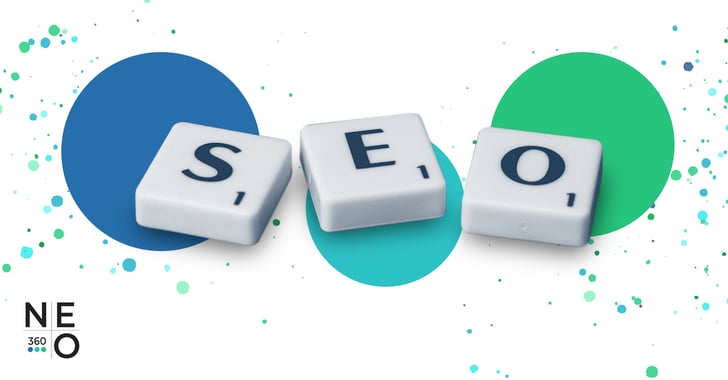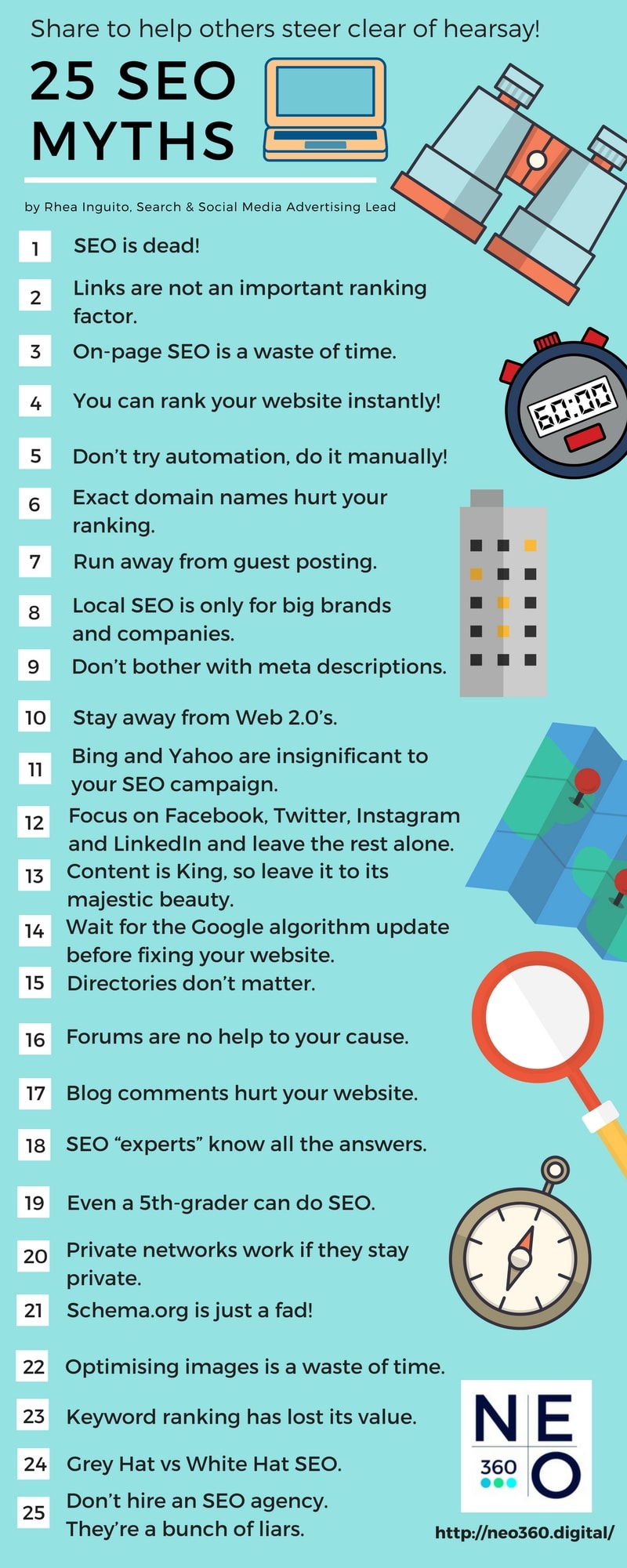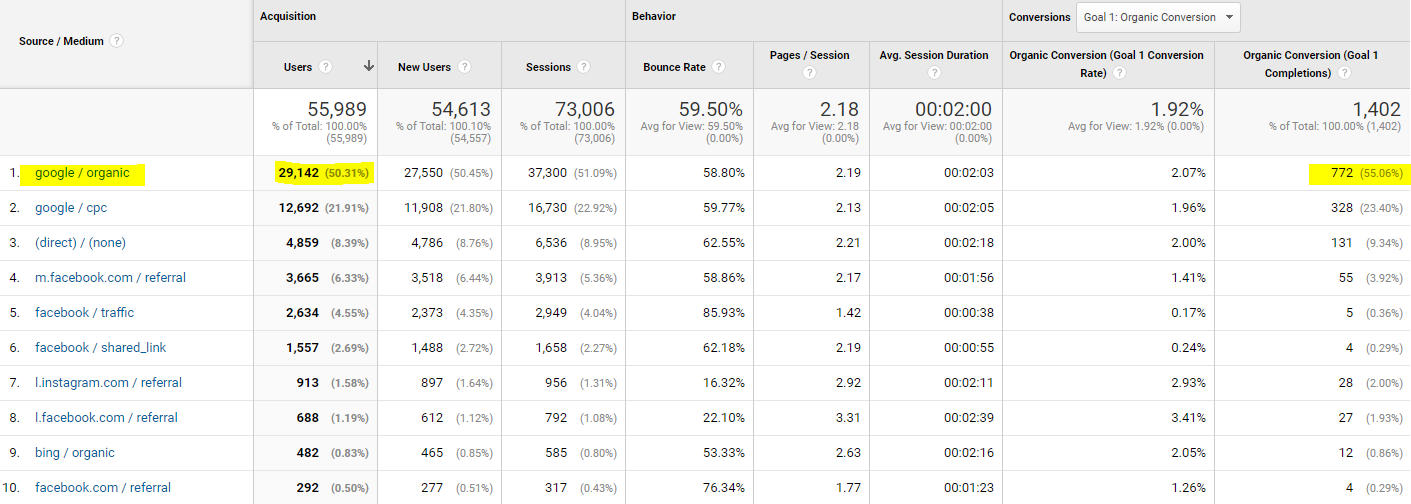Steer Clear of Hearsay—and these 25 SEO Myths

Don’t believe everything that you hear!
When it comes to using Search Engine Optimisation or SEO for your business, you’re bound to hear something which either encourages its use, or encourages you to disregard it as an outdated or an ineffective marketing tool.
See if you can find what you’ve heard among the 25 myths I’ve listed below, and reflect on whether what you think you know about SEO is helping or hindering your business’ growth.

Share this Image On Your Site
1. SEO is dead!
Contrary to what so-called “experts” say, SEO was very much alive in 2019, and will remain a significant channel for growing your business.

Google organic is still no. 1 source of website traffic and conversion (From Client A, Google Analytic Data, 2019)
2. Links are not an important ranking factor
Let’s be clear about this. Google released a carefully-crafted PR effort in the first quarter of 2016 saying that links were no longer a major ranking factor in their algorithm. However, various case studies and third-party SEO tools say otherwise.
Stone Temple published the 2019 version of the study that shows a very significant correlation between links and ranking position in Google search.
3. On-page SEO is a waste of time
At NEO360, we’ve seen firsthand how well-executed, on-page SEO efforts turned our clients’ websites from “nobody” into “somebody”. It may be tedious and the results may not be immediate, but trust us, we know how it works, and it’s definitely worth your time.
4. You can rank your website instantly!
The SEO of 2019 is not the SEO of 2010. The rules of the game have changed and you can expect the ROI from your SEO efforts to take some time. Depending on the competitiveness of your keywords, your new website can take as long as six months to rank. For existing websites with penalty issues, it takes more than six months to repair the damage. Results may vary from case to case. For existing domains without penalties and zero SEO, a little tweak here and there can rank a website for competitive keywords in three months or less.
5. Don’t try automation, do it manually!
As the saying goes, too much of anything is bad, and this goes for SEO automation, too. If done incorrectly, things will go awry. However, if you have a blueprint, a prepared process, and extensive testing, SEO automation used with trusty tools can work magic to speed up your search engine ranking.
6. Exact domain names hurt your ranking
Following Google’s Exact Match Domain (EMD) update in 2012, many business owners stayed away from exact match keyword domains, fearing Google might penalise their website. However, we’ve seen websites using exact domain names ranking relatively well in Google search results. Google’s latest ranking criteria emphasises content and user experience, so if you can provide those well enough while keeping your exact domain name website, you just might escape Google’s eagle eyes. :)
7. Run away from guest posting
It’s a no-brainer: getting your content posted in relevant and high-ranking websites will surely not hurt your ranking. It’s how other SEO marketers have used guest posting in the past which has marred its reputation.
8. Local SEO is only for big brands and companies
Some small and medium business owners think it’s very difficult to rank in Google’s local listings. They think only well-established brands or companies have a shot at being listed. To free you from this lie that keeps you from making any attempts to rank your website on local listings, allow us to tell you loud and clear: YOU CAN BEAT BIG COMPANIES AND COMPETITORS IN GOOGLE’S LOCAL LISTING ARENA. We even think that this may be your best chance of seeing your website on the first page for a competitive keyword, so get to work!
9. Don’t bother with meta descriptions
Three to five years ago, Google removed meta descriptions as a ranking factor in their algorithm. Non-techies and beginners might have wanted to skip meta descriptions on their on-page SEO checklists, because why would anyone focus on something Google didn’t consider relevant?
But here’s the thing: in the ever-changing digital marketing landscape, where user experience is at the forefront of Google’s quest for relevancy and sustainability, it would be difficult to ignore the importance of meta descriptions when it comes to business. A well-optimised meta description can increase your website’s Click-Through Rate or CTR, which is the percentage reflecting the number of people who actually click through to your website after seeing it in search results. With 10 competitors vying for one click from one prospective customer, having a relevant and distinct meta description can surely make your website stand out, even if it isn’t first in line.
10. Stay away from Web 2.0’s
Gone are the days when Hubpages, Squidoo and other Web 2.0 sites were considered important Google ranking tools. In fact, some of the big Web 2.0 sites like Blog.com and Posterous have slowly disappeared from the scene.
We remember the time when one of the priorities for setting up SEO campaigns was to create Web 2.0 accounts for Link Wheels and article distribution. It was so easy back then to rank on Google with the help of these sites. But despite its lost glory, we believe Web2.0 remains important in a successful SEO campaign, even though different techniques and strategies are needed to make it great again for a digital marketing campaign.
11. Bing and Yahoo are insignificant to your SEO campaign
This may be true for Yahoo, but Bing is an entirely different matter. We’ve been using “Google” as synonymous with “search engine”, with the hidden notion that if you can rank on Google, you can rank on Bing. This may not always be true.
Remember, these two giant search engines use different algorithms. In recent years, Bing’s share of the search market has been growing faster than Google’s, with Bing slowly eating away at Google and gaining more market share.
12. Focus on the Big Four social media websites (Facebook, Twitter, Instagram and LinkedIn) and leave the rest alone
There has been a lot of talk about SEO branding since 2015. Although the idea remains in vogue despite its being difficult to implement (let alone to measure), we believe that this will be one of the next big things in SEO for the next five years. This is why we encourage our clients to create other important social media profiles on platforms such as Flickr and Tumblr, before anyone else claims their URL’s and ruins their SEO branding in the future.
13. Content is King, so leave it to its majestic beauty
Content may be the King, but SEO is the Queen! It’s a huge mistake, and a wasted opportunity for business owners to leave their blog posts unoptimised for SEO.
No matter how “kingly” your content is by its own merit, if no one visits your website (let alone reads your blog posts), your content will remain a long lost treasure buried deep in the sands of lost opportunity.
14. Wait for the Google algorithm update before fixing your website
For fear of totally ruining their website after getting penalised by Google, some business owners wait for the next algorithm update before cleaning up their act. Some even hope that the next update saves them from their current situation; after all, Google might have made a mistake in penalising their websites. But, this seldom happens.
For websites affected by penalties, we highly recommend their owners to clean them up before the next algorithm update. We’ve seen this happen with one of our clients and we were only too glad to help them escape Google’s penalty box.
15. Directories don’t matter
We beg to disagree. Relevant and high-ranking local directories still matter. They are a huge boost to a local SEO campaign. In fact, local directories are one of the major factors in getting listed on Google’s local listings.
16. Forums are no help to your cause
As we’ve said, too much of anything is bad. When done right, forum posting can really add SEO value to your campaign. This may not have a direct effect on your SEO, but the way you position your brand or company on a relevant local forum can be a huge push for your campaign, as more direct traffic heads over to your website because of your involvement in local forums. This will not escape Google’s notice.
17. Blog comments hurt your website
Blog posts are among the best ways to connect with industry influencers and prospective customers. I wouldn’t easily dismiss this technique just because some crazy SEO robots have used it for spamming and keyword stuffing.
18. SEO “experts” know all the answers
We believe that no one in the industry knows EVERYTHING about SEO. It’s a growing and volatile industry where rules and guidelines change almost every year.
19. Even a 5th-grader can do SEO
After the series of algorithm updates that began in 2012, I dare anyone to say SEO is easy. There are times when it’s really difficult to rank your website on the first page, let alone keep it there for a long time.
20. Private networks work if they stay private
I would be careful doing anything on private networks; however, if you know how to bend the rules without breaking them, I think anyone would still be able to benefit from private networks. We do, however, suggest caution.
21. Schema.org is just a fad!
Trust us, Schema works—especially when it comes to improving your local SEO campaign.
22. Optimising images is a waste of time
Some business owners do not understand the importance of their assets, including their own images.
23. Keyword ranking has lost its value
Keyword ranking remains the primary metric in measuring SEO performance.
24. Grey Hat vs White Hat SEO
There’s no such thing as White Hat SEO. You entered the Grey Hat realm the moment you began your SEO campaign.
25. Don’t hire an SEO agency. They’re a bunch of liars
You may have had a bad experience working with an SEO agency or two, and we understand your disappointment. It would be unfair, however, to throw the baby out with the bathwater. You just haven’t met the right agency, yet.
Get to know specialists at NEO360 who know how to separate fact from fiction, to help your business use SEO right.
About the Author
Managing Director
A Mechanical Engineer by training who graduated from the Nanyang Technological University. With over 15 years of experience working in Start-Ups, SMEs and MNCs, he has driven sales revenue and leads across the Asia Pacific region. Shei Wah was one of the SEO Speakers at the first Search Engine Strategies Conference 2011 held in Singapore. As Managing Director, he aims to establish NEO360 in all of the world’s major cities. Even as he works toward this goal, Shei Wah also dreams of his children’s future happiness, and unwinds by doing calisthenics with his former school buddies three times a week.




